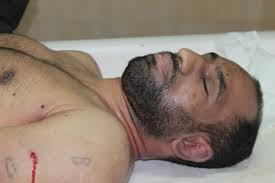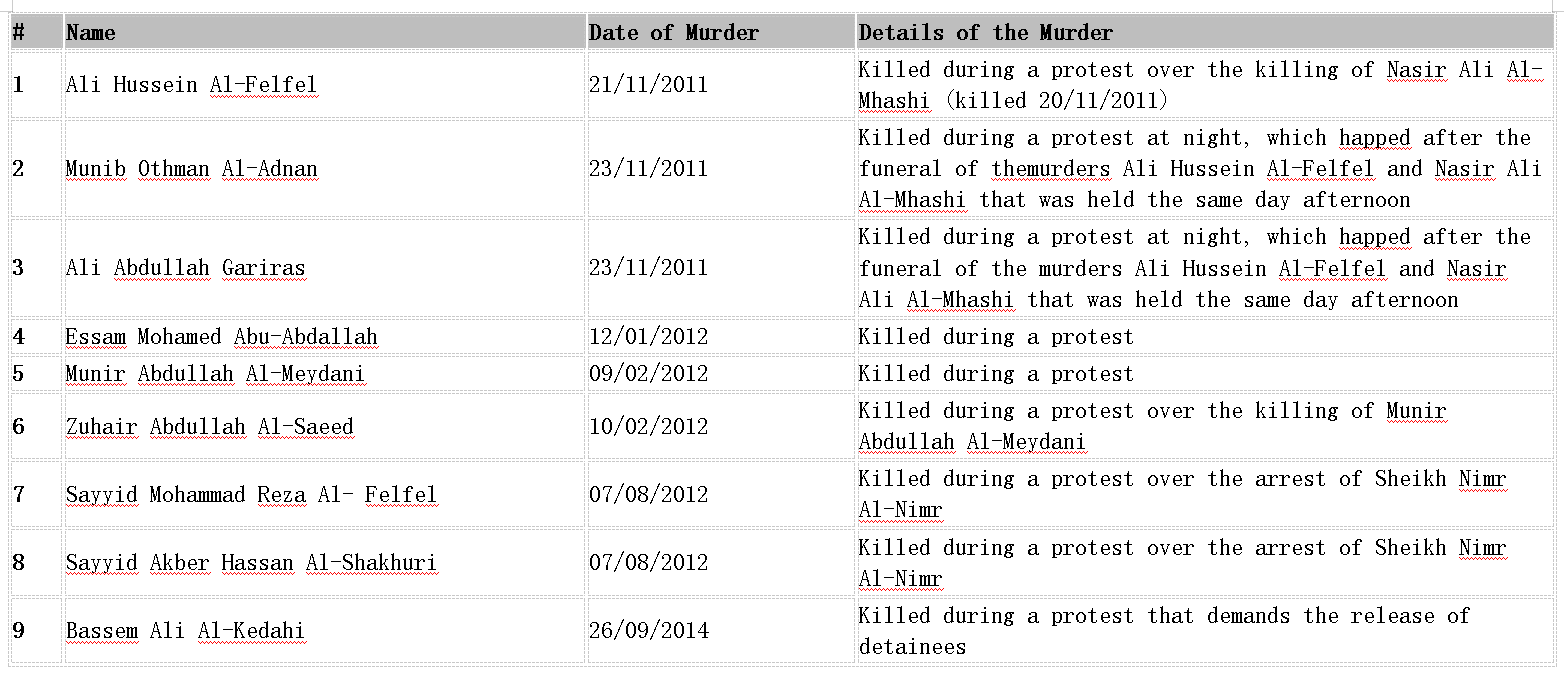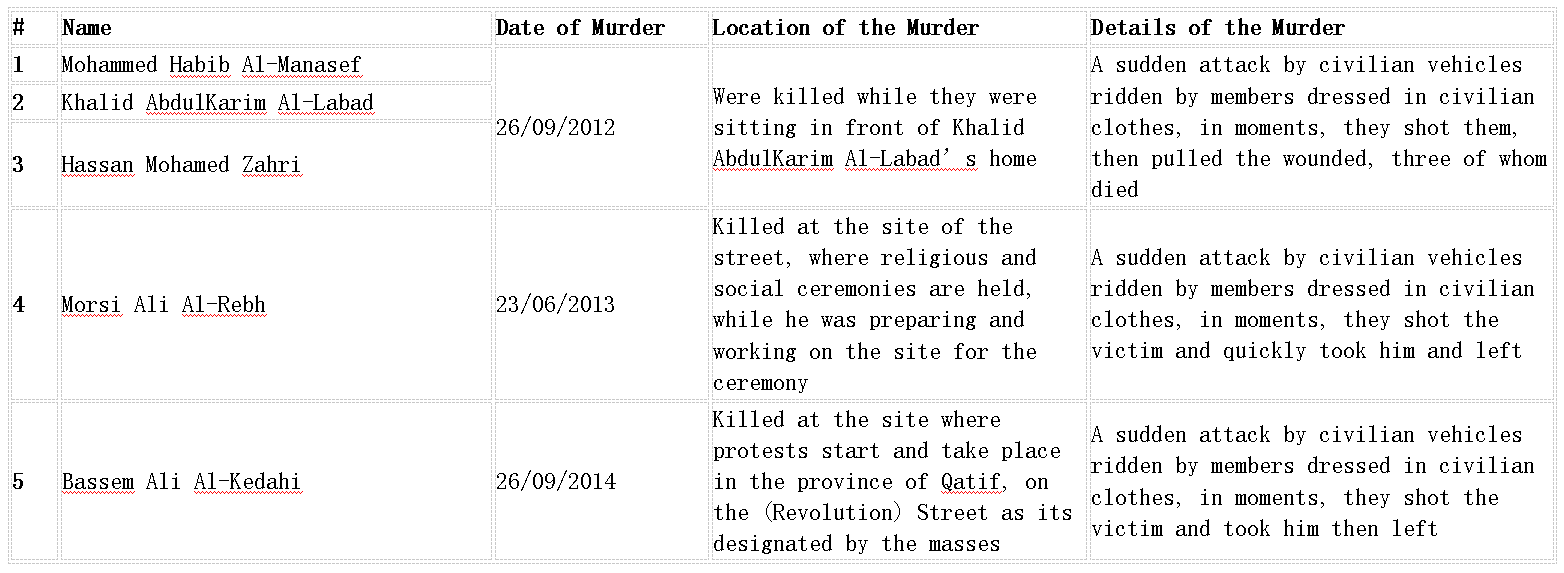
The European Saudi Organization for Human Rights (ESOHR) expresses its deep concern about the recurrence of the extrajudicial executions against peaceful assembly. As on 20/09/2014 at 08:45pm, a Saudi Security squad were riding two civilian vehicles have heavily shoot a group of men, along with some women, who were preparing to start a protest which demands the release of prisoners of conscience.
This attack resulted in the killing of a protestor (Basim Ali Al-Quadaihi 36 years old), who died of multiple wounds as it has been documented prior to his burial: 23 bullets, according to eyewitnesses; 7 bruises from being dragged; at least 3 cigarette butt burns; two deep cuts that seemed to be done with a sharp knife and a broken right hand. These wounds reach a total of 36 on Alquadaihi’s body to confirm that he faced brutal acts. According to eyewitnesses who saw Al-Quadaihi’s body, it appears that he was tortured before dying.
He was taken into one of the cars, which carried out the attack, to an unknown location. Two other wounded protesters were arrested from a private hospital after being taken there by people. Also, there are so many other injured protesters, but ESOHR wouldn’t reveal the number or detail around them for security reasons.
The number of dead people who were shot by security forces reach 21 civilians in the period from 20/11/2011 until 09/26/2014, nine of whom were killed in protests, as follows:

Also, five other citizens were killed in as a sudden attack, which was carried out by civilian vehicles ridden by security force, some of whom were wearing masks:

These facts confirm the Saudi government’s continues violations of international laws, which grant the freedom of expression and peaceful assembly, where (Some cases of unlawful killings by law enforcement officials involve the use of force that no one would argue is lawful under either international or domestic law)[1]. This indicates that the use of excessive force by law enforcement officials result of a systematic and granted immunity from higher and powerful government bodies that open the door to impunity.
The Saudi government did not respond to the request by (the Special Rapporteur on extrajudicial, summary or arbitrary executions), Mr. Christof Heyns. In September 2013[2], Mr. Heyns asked the Saudi government to provide him with copies of the national laws relating to the use of force, and by that time, the Saudi security force had already killed 17 citizens through the use of excessive force and bullets, starting from the first victim fell in November 2011 since the beginning of protests in 2011.
Based on the United Nations (UN) General Assembly’s decision on December 15, 1989 which have been adopted the (Principles on the Effective Prevention and Investigation of Extra-legal, Arbitrary and Summary Executions), the Saudi government’s systematic behavior is subjected to legal accountability, as Article 1 in the Prevention’s section stats (Governments shall prohibit by law all extra-legal, arbitrary and summary executions and shall ensure that any such executions are recognized as offences under their criminal laws, and are punishable by appropriate penalties which take into account the seriousness of such offences) [3]. And exceptional circumstances cannot be accepted as a justification by the Saudi government: (In order to prevent extra-legal, arbitrary and summary executions, Governments shall ensure strict control, including a clear chain of command over all officials responsible for apprehension, arrest, detention, custody and imprisonment, as well as those officials authorized by law to use force and firearms, Prevention Article 2).
Also, in the failure of the Saudi government to investigate the killings situations, this confirms its direct responsibility for the killings. Thus, we as the ESOHR urges the Saudi government that (There shall be thorough, prompt and impartial investigation of all suspected cases of extra-legal, arbitrary and summary executions, Investigation Article 9). So (Governments shall ensure that persons identified by the investigation as having participated in extra-legal, arbitrary or summary executions, Investigation. Article 18).
A statement by the Interior Ministry states the murder was due to a confrontation between the protestors and the security forces, but this was denied by a number of eyewitnesses that spoke to ESOHR, some of whom are protestors.
The (Report of the Special Rapporteur on extrajudicial, summary or arbitrary executions) procedures under “The Right to Life”, that the use of force has to meet several requirements, including:
– Sufficient legal basis.
– Legitimate Objective.
– Necessity.
– Prevention/precaution.
– Proportionality.
But none of the above factors were met in Bahrani’s killing situation, as:
– He was not killed based on a court ruling or a precaution (sufficient legal basis).
– He was not killed to save another person’s life or protect another person from a serious injury (legitimate objective).
– There is not sufficient evidence in Al-Kedahi’s murder, the two other wounded and terrorize women who were preparing to start a peaceful protest (necessity).
-There is no evidence that there was a threat to the security officers or pedestrians by the peaceful protesters, but a surprise armed attack from the back and the front is what was done by the Saudi government only (prevention/precaution).
– And there was no violent reaction practiced protestors, not starting or response (proportionality).
We also inform the Saudi government that the use of terrorism’s terminology on human rights defenders and protestors in the media and in the indictments, does not justify the murder: (States should not use emergency situations or terrorist threats as a pretext to erode the right to life by granting unchecked powers to use force to their law enforcement officials). [5] .
The ESOHR believes that the Saudi government’s insistence to deal with freedom of expression, freedom peaceful assembly through the use of excessive force, is not consistent with its position occupied in the Human Rights Council as an elected member until 2016. The Constitutive Act of the Council states: (that members elected to the Council shall uphold the highest standards in the promotion and protection of human rights [4]), and this is not met by the Saudi government.
We are in ESOHR calls on the Saudi government to stop the impunity policy, which we believe is the main reason for these violations, such as murder and torture, as we call on the Saudi government to stop targeting nonviolent resistance as the freedom of expression and peaceful assembly that guaranteed by human rights laws.
[1] [1]Report of the Special Rapporteur on extrajudicial, summary or arbitrary executions. Christof Heyns, section 25, 1 April 2014, A/HRC/26/36 http://www.ohchr.org/EN/HRBodies/HRC/RegularSessions/Session26/Documents/A-HRC-26-36_ar.doc
[2] [2] same source as number 1, section 35
[3] United Nations (UN): Principles on the Effective Prevention and Investigation of Extra-legal, Arbitrary and Summary Executions Recommended by Economic and Social Council resolution 1989/65 of 24 May 1989 1
http://www1.umn.edu/humanrts/arab/b054.html
[4] United Nation (UN): Resolution adopted by the General Assembly 60/251. Human Rights Council, A/RES/60/251, Article 9
[5] نفس المصدر، الفقرة 125
